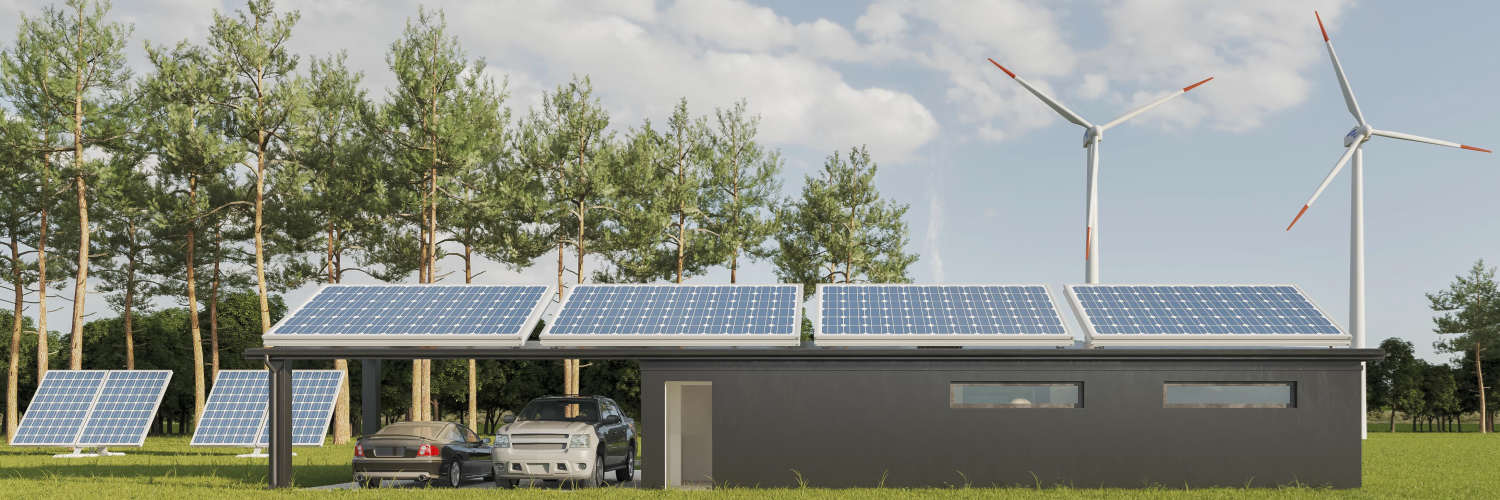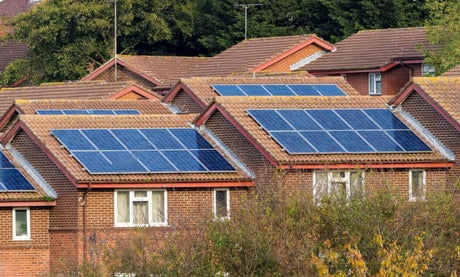Between 2004 and 2020, the European Union’s share of renewable energy more than doubled reaching 22.1% in 2020, up from just 9.6% in 2004. In the United Kingdom, reliance on solar energy has also been steadily climbing for over a decade, in large part due to the government’s numerous benefits and tax advantage programs. For example, in 2019 there were over 8,900 energy systems replaced by solar systems under the government’s renewable heat incentive.
Why are so many businesses, governments and private citizens turning to solar energy uk? What are the advantages and disadvantages of solar energy? How does a solar energy storage system work?
In this blog, we’ll cover the advantages and disadvantages of solar power, specific benefits, how solar panel systems work and why solar energy is increasingly becoming more and more popular across the UK.
Table of contents:
- Advantages and Disadvantages of Solar Power
- Pros of Solar Energy
- Disadvantages of Solar Energy
- Pros and Cons of Solar Panels
- Benefits of Solar Panels
- Disadvantages of Solar Panels
- How Does Solar Energy Work: Step-by-step
- Make the Best Decision with Renogy
Advantages and Disadvantages of Solar Power
In 2019, there were over 1,000,000 solar photovoltaic (PV) systems counted in the UK. It’s no secret that solar energy uk is growing in popularity across England, Ireland and Scotland. If you are pondering whether or not solar is a good energy option for you, your home or your business, it’s best to analyse the advantages and disadvantages it provides.

In the following section, we dive deep into all of the pros and cons of solar energy to help you form a more in-depth understanding of this extremely popular renewable energy source. No need to wonder what are the benefits of solar energy anymore – we have you covered.
By the way, we also have another article telling you the 10 common myths about solar power.
Pros of Solar Energy
Leveraging the power of a solar power system provides users with numerous advantages, and contrary to popular belief solar power does not require 24/7 sunlight to work. Below is a high-level overview of the energy source’s primary benefits:
● Lowered electric bills and utility costs
● Positive impact on the global environment and climate change
● Numerous applications beyond residential use
● Reduced cost of maintenance
● Long-term cost savings
● Continued advancement of technology for more efficient residential solar energy systems
As one of the top forms of sustainable energy available, solar power provides users with a host of unique advantages over traditional forms of energy (such as electricity).
Benefits of Solar Energy to the Environment
Apart from the financial benefits that solar offers, the environmental benefits are huge – lowered greenhouse gas emissions, the ability to generate power even on cloudy days and lower reliance on foreign energy sources such as gas or oil. Lowering the emission of greenhouse gases is one of the top ways to combat climate change, and replacing widely used energy sources such as coal or natural gas with solar power can dramatically impact not just your local region’s environment but the entire globe.
Economic Benefits of Solar Energy
In the past, solar panel installations could only be done by well-off homeowners or businesses with a surplus of funds – this is no longer the case. Solar energy is the most affordable it has ever been, and the cost of installing, maintaining and upgrading solar panel systems is consistently dropping year over year. Here are some of the top ways that solar energy can provide users with financial benefits:
● Dramatically lowered utility and energy bills
● Long-term and short-term cost savings
● Government-sponsored tax rebates and incentive programs
● Ability to generate an increase in home or property value
For homeowners, the potential of solar power lowering their utility bills (or removing them completely) is a major draw and one of the primary reasons why the energy source has grown in popularity in recent years. And, by using a lithium ion solar battery or solar generator, users can efficiently store the power generated by their panel system for later use, greatly lowering their reliance on the power grid and thereby lowering utility bills even further.
Another often overlooked benefit is the fact that homes with solar panels typically sell much faster than homes without them, and in some cases can increase the property value of the home altogether. In fact, in the UK, properties that have installed solar panel systems can sell up to 20% quicker than other properties.
Disadvantages of Solar Energy
There are multiple significant benefits of solar energy, but solar is not a perfect energy source and there are several considerations to keep in mind before investing in a system or buying solar panels for your property. For example, although the cost of solar panel systems has dramatically lowered over the past decade, startup costs can still be a potential drawback for users, especially those with lower income levels. Here are some of the other potential disadvantages of solar energy to consider:
● Depending on the type of panels, battery and system you install, efficiency can be a problem. Generally speaking, the lower the quality (and price) of a system, the less efficient it will be. This is why startup costs can be a dealbreaker for some homeowners – getting the most cost savings often requires investing in better hardware.
● Weather dependence is another potential issue. Even though solar has grown in popularity across the UK, many homeowners often doubt its ability to generate enough power with the region’s often cloudy and gloomy weather. The good news is that solar panels can still generate power even on cloudy days, but top efficiency won’t be reached if the weather isn’t favourable to the system.
● Solar panel systems operate at their best when coupled with a battery storage system. Batteries and their associated hardware can be expensive, sometimes even more than the panels themselves. In order for homeowners and business owners to get the most out of their systems and lower their reliance on the national power grid, it’s recommended to purchase an accompanying battery storage system – these can add to the upfront costs and maintenance expenses.
Pros and Cons of Solar Panels
Solar panels are the primary piece of hardware required to harness the power of the sun, and just like solar energy in general, there are certain advantages and disadvantages to consider before purchasing panels for your home, business or property.
Benefits of Solar Panels
The benefits of solar panels and energy are extensive, and one of the more overlooked aspects of solar is how it is a more reliable and steady form of energy compared to grid-supplied electricity or other resources. The cost of energy is constantly rising and often depends on the movement of global markets, supply and demand or price fluctuations – solar energy mitigates these rising and ever-changing costs by putting control back into the user’s hands. Even if grid-based power costs rise, your solar panel system will be able to mitigate these costs by being an off-grid energy source.

The financial benefits of solar panels are another primary advantage that homeowners and business owners alike factor into their decisions to purchase a system. Leveraging solar panels can have a major impact on utility and power bills from the moment they are installed. With a standard system, homeowners can receive decades of free power generation with minimal maintenance costs – and when coupled with a powerful lithium battery, solar power can cut electric costs down to zero.
Return on investment (ROI) is another crucial aspect of solar panels. Although purchasing a solar system and installing it can be costly, the system will eventually pay for itself many times over. When combined with government incentives and tax rebates, the ROI can become even more powerful (and be obtained faster).
Disadvantages of Solar Panels
One of the biggest drawbacks of solar panels is their cost – high-quality solar panels, or large systems, are a pricey investment. Homeowners will make the investment costs back over time, but it can take years in cost savings to pay off the cost of purchasing and installing a solar panel system.
Although installing solar panels on your own is certainly possible, it is generally recommended to hire a professional installation company for proper installation and to mitigate incorrect setup. This can increase the initial costs of purchasing a system, with the price depending on the specific company or contractor you hire, where your property is located and how large your solar panel system is.
Another disadvantage of solar panels is the fact that they require ample space. The majority of panel systems are installed on the roofs of a building; however, depending on the size of your home or business, the roof space might not be enough to power your property. Related to the installation location is the fact that solar panels are difficult to move once they are installed, making choosing the solar panel system’s location an important decision during the setup process.
How Does Solar Energy Work: Step-by-step
While the deep-level inner workings of domestic solar energy storage systems can be highly complex, how solar energy works is relatively simple when viewed from a high level. Below is a step-by-step process of how solar panels generate power from the sun:
1. Sunlight activates the solar panel’s cells
2. The solar cells generate electricity
3. The electric power is transferred into usable electrical energy (converted from DC to AC)
4. The usable electricity is made available to your home, property or business
Photovoltaic (PV) technology has come a long way since the early days of solar power, and more homeowners than ever are harnessing the sun’s rays for lowered energy bills, increased sustainability, and decreased reliance on power grids. Now that you know a bit more about solar’s benefits and potential drawbacks, you’ll be able to make a more informed decision about whether or not you want to invest in this constantly evolving and exciting renewable energy source.
Make the Best Decision with Renogy
Fascinated by the advantages of solar energy and feel like investing in a solar power system but don’t know where to start? Contact Renogy for custom suggestions.
Renogy has over ten years' experience in developing user-friendly solar products, winning immense popularity among RV owners and homeowners who seek to outfit their property with a solar power system or complement their existing PV system with a home energy storage solution. Renogy also announced the release of Lycan 5000, and Pheonix 300, as well as the powerful REGO series recently. Let Renogy be your help in the journey of going solar right now.
Related articles:
What are the most efficient solar panels? ————What to know about solar panel efficiency levels
Building An Off Grid Solar System In The U.K.
Common Challenges to Going Solar









